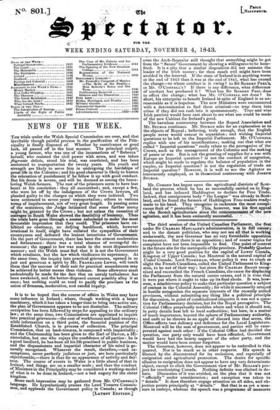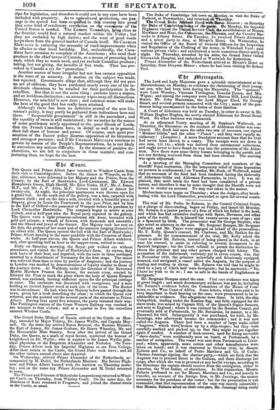The third session of the United Canadian Parliament, the first
under Sir CHARLES METCALFE'S administration, is in full career; and to the distant politician, who may not see all that is working underneath, the new Governor has no very formidable opposition to encounter. But there is an opposition ; and of course topics for complaint have not been impossible to find. One point of contest is the future site for the metropolis of the province. Probably Quebec might be a very good position for the capital of Lower Canada, Kingston of Upper Canada ; but Montreal is the natural capital of United Canada. Lord SYDENHAM, whose policy it was to crush or slight the French Canadians, called the United Parliament to King- ston, to be out of their way ; but since Sir CHARLES BeGoir recog- nized and reconciled the French Canadians, the cause for displacing the Parliament from the natural centre ceases, and it is time that it were put where it ought to take up its final abode. It was, how- ever, a mischievous policy to make that particular question a subject of contest in the Colonial Assembly ; for while it necessarily arrayed in hostile antagonism the separate interests of the recently united provinces, without submitting any thing like a political principle for discussion, in point of constitutional etiquette it was not a ques- tion for Parliamentary decision, but for the Royal prerogative. The Colonial Office perpetually meddles where and when it should not, in petty details best left to local authorities ; but here, in a matter of much importance, beyond the sphere of Parliamentary authority, and unfit to be thrown as an apple of discord into that arena, the Office affects vast delicacy and deference for the Local Legislature. Montreal will be the seat of government, and parties will be exas- perated against each other : if the Colonial Office had decided the question, one party only would have been offended, Government would have had the hearty support of the other party, and the matter would have been sooner forgotten. The Governor, however, does not appear to be embroiled in this quarrel. Nor is he much so in other respects. His speech is blamed by the discontented for its omissions, and especially of emigration and agricultural protection. The desire for specific allusion to emigration does not appear to have any very determinate object, except to elicit the Government view of Mr. BULLEB'S pro- ject for recolonizing Canada. Nothing definite was elicited in de- bate. Discussion of it was avoided, on the plea that it was not "officially" under consideration ; and exception was taken to "details." It does therefore engage attention on all sides, and ob- jection points principally at "details." But that is as yet a mea- sure in embryo, whereas the speech was a programme of measures ripe for legislation, and therefore it could not in any case have been included with propriety. As to apicultural protection,, one pas- sage in the speech has been magnified in this country into proof that some kind of retaliatory restriction on the commerce of the United States is needed. The Eastern Townships, lying close to the frontier, would find a natural market within the Union ; but they are excluded by high duties ; and the want of good roads keeps them from the general market of Canada itself. Sir CHARLES METCALFE is enforcing the necessity of road-improvements when he alludes to that local hardship. But, undoubtedly, the Cana- dians have occasion to complain of the Americans ; who send their produce to the chief towns of Canada, as a means of procuring hard cash, which they so much need, and yet exclude Canadian produce ; taking, but not giving, the benefits of free trade. That has pro- voked in Canada a cry for "protection."
Another source of more irregular but not less earnest opposition is the want of an amnesty. A motion on the subject was made, but rejected. Government allege that, although they did not pass an act of oblivion, they have pardoned nearly every one of the in- dividuals obnoxious to be assailed for their participation in the rebellion. But that is not the same thing : pardons leave a stigma, and an invidious distinction ; an amnesty wipes away all distinctions. However, the mischief is now done ; and common sense will make the best of the good that has really been attained.
Although there has been no definitive avowal of the new Go- vernor's policy, it may partly be gathered from indications here and there. " Responsible government" is still in the ascendant ; and the equality of races is still maintained ; for we notice by the names of some gentlemen newly appointed to the quasi House of Lords, that the French Canadians have, in detail as well as in general, their full share of honour and power. Of course, such quiet pro- secution of the BAGOT policy disarms opposition of its bitterness and strongest pretexts ; and if Sir CHARLES METCALFE continue to govern by means of the People's Representatives, he is not likely to encounter any serious difficulty. In the absence of positive de- clarations, we are left to conjecture in these matters ; and con- jecturing thus, we hope for the best.



























 Previous page
Previous page